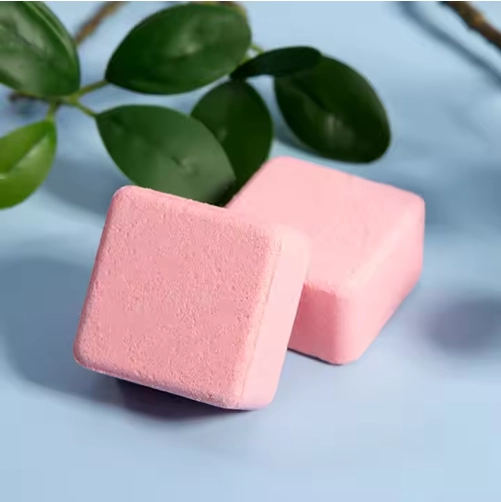What Are "bath salts?"
Synthetic stimulants, often referred to as “bath salts”, are from the synthetic cathinone class of drugs. Synthetic cathinones are central nervous stimulants and are designed to mimic effects similar to those produced by cocaine, methamphetamine, and MDMA (ecstasy). These substances are often marketed as “bath salts,” “research chemicals,” “plant food,” “glass cleaner,” and labelled “not for human consumption” in order to circumvent the application of the Controlled Substance Analogue Enforcement Act.

Where Do Bath Salts Come From?
Cathinone comes from a khat plant in East Africa and southern Arabia. You can chew the leaves of the khat plant to get a mild stimulant effect. The human-made version of cathinone in bath salts is stronger and more dangerous.
Bath salts are sometimes used as a cheap substitute for stimulants like cocaine. Research shows that one common synthetic cathinone, called 3,4-methylenedioxypyrovalerone (MDPV), is 10 times stronger than cocaine.
Drug effects can include a short-term increase in energy and mood and acting strangely friendly to others.
How Are Bath Salts Used?
Bath salts are sold as a white or off-white powder, mostly in small plastic or foil packages. The drugs are usually snorted (sniffed up a nostril). They also can be swallowed, smoked, or mixed with a liquid and injected with a syringe.
What Do Bath Salts Do?
Bath salts contain manmade chemicals that increase brain and central nervous system activity in much the same way as drugs like amphetamines or MDMA (Ecstasy).
Bath salts can cause users to experience an out-of-body experience, be in an elated mood, or feel delirious. These effects can last up to 3–4 hours.
Other short-term effects include:
- agitation and irritability
- insomnia
- dizziness
- panic attacks
- depression
- suicidal thoughts
- paranoia
- delusions and hallucinations
- distorted sense of reality
- decreased ability to think clearly
- mood disturbances and psychosis
Physical effects of bath salts include:
- decreased muscle and body control
- increased blood pressure and body temperature
- chest pains
- irregular heartbeat
- nosebleeds
- feeling sick and throwing up
- seizures
- stroke
- heart attack
- brain swelling
Users can also develop what is called "excited delirium." When this happens, people get dehydrated, their muscle tissue breaks down, and they can go into kidney failure and die.
Long-term abuse of bath salts may cause people to have hallucinations, hear voices, feel paranoid, and develop a psychosis that resembles schizophrenia.
People who use bath salts easily can get addicted to them. They may feel driven to do whatever they can to keep getting high, including taking risks.
How to use Bath Salts
To properly reap the benefits of bath salts, make sure you set aside enough time for a long, uninterrupted soak. Removing distractions (putting those notifications on silent!) will allow your mind to unwind fully.
- Step 1: Fill your bath with warm (but not scalding) water. Use this time to make your environment as calming as possible. Why not light a candle, play some gentle music or listen to a podcast?
- Step 2: Once your tub is half full, add a generous handful of bath salts to the water. Use your hands to swirl the water around, allowing the salts to dissolve.
- Step 3: Continue to run the bath until it’s at your desired depth.
- Step 4: And it’s time to soak! Hop in, lie back, and relax. If possible, we recommend a 20- —to 30-minute soak—or longer! This will give ample time for your skin to absorb those nourishing minerals while your mind slowly unwinds.
- Step 5: After bathing, your mind and body should feel thoroughly relaxed. To prepare for the perfect night’s sleep, massage our luxurious Crème Souffle into the skin once dry. Enriched with a nourishing blend of Mango and Jojoba Oils, it will leave your limbs feeling beautifully soft and hydrated. To complete your wellness routine, liberally spritz your pillow with our Wellness Sleep Mist before climbing into bed.
How Long Do the Effects of Bath Salts Last?
On average, the effects of bath salts last 3 to 4 hours. You can have what is called “excited delirium.” If you have this, you will get dehydrated, your muscle tissue will begin to break down, and your kidneys may stop working.
Short-term psychological effects of bath salts can include:
- Depression
- Delirium
- Psychosis
- Thoughts of suicide
- Panic attacks
- Paranoia
- Hallucinations (seeing things that aren’t there)
- Irritability
If you use bath salts for a long time, you can become suspicious (paranoid) of others.
Even if it’s your first time using bath salts, you could die from an overdose.
Along with these psychological effects, the drug can trigger physical effects, including:
- Nosebleeds
- Nausea
- Stroke
- Seizures
- Loss of muscle control
- High blood pressure and heart rate
- Headaches
- Teeth grinding
- Chest pain
- Confusion
- Prolonged pupil dilation
- Palpitations
- Sweating
- Heart attack
Send Inquiry





